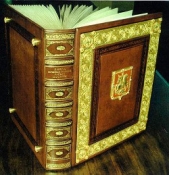Как Это Сказать По-Английски?

Как Это Сказать По-Английски? читать книгу онлайн
Книга представляет собой комплексный курс, разработанный в соответствии с принципами авторской образовательной технологии. Автор предлагает изменить направление, в котором традиционно происходит процесс обучения иностранному языку, на противоположное и расширять свои знания, отталкиваясь не от незнакомого чужого (английского), а от привычного родного (русского). Эффективная система упражнений закрепляет навыки разговорной речи и помогает преодолеть психологический языковой барьер. Текстовой материал содержит около 200 идиоматических выражений и расширяет словарный запас до 1800 лексических единиц.
Настоящий учебник рассчитан на широкий круг пользователей. Он предназначен и для тех, кто только-только начал изучать английский язык, и для тех, кто уже много лет пытается научиться говорить по-английски, но так и не может разобраться в сложностях употребления английских грамматических времен, и для тех, кто решил повторить видовременные формы английского глагола во время подготовки к вступительным экзаменам в высшие учебные заведения, и для тех, кто захотел покончить с «немым знанием языка» и ЗАГОВОРИТЬ, НАКОНЕЦ, ПО-АНГЛИЙСКИ!
Внимание! Книга может содержать контент только для совершеннолетних. Для несовершеннолетних чтение данного контента СТРОГО ЗАПРЕЩЕНО! Если в книге присутствует наличие пропаганды ЛГБТ и другого, запрещенного контента - просьба написать на почту [email protected] для удаления материала
бег трусцой — jogging
бездельничать — to idle; to do nothing
болеть за (кого-то) — to be a fan (of); to support
быть изумленным — to be amazed
великий — great
демонстрировать — to demonstrate
журнал — a magazine; a journal
забег — a round
играть на сцене — to act on the scene
именно — just; exactly, in particular
любитель (непрофессионал) — an amateur
любительский — amateur
обратиться в — to apply to отдых
на море — the rest at sea
плавание — swimming
по городу — over the town
подводное — underwater
посвящать — to dedicate to; to devote to
после окончания — after finishing
праздновать — to celebrate
принимать участие — to take part (in), to participate (in)
просматривать газеты — to look through, to run through newspapers
пятилетний юбилей — a five-year anniversary
разносить — to deliver
распространять — to spread
рафинированная публика — refined audience
ребенок — a child; an infant; a baby; a kid разг.
сенсационный материал — feature
сотрудник газеты — a contributor
спорный — arguable
статья — an article
стихи — poem(s)
строка — a line
существовать — to exist
так и — simply, just…
туристическая фирма — tourist agency
уважать — to respect, to have respect (for)
увлекаться — to be keen (on smth.); to take a fancy (to smb.)
уйти на работу — to leave for work
утренняя газета — morning newspaper
чудный — wonderful, marvellous
чужой (беспризорный ребенок) — a gutter-child
КЛЮЧИ
Урок 1
He often plays the fool.
Does he often play the fool in the evenings?
How often does he lose temper?
He never loses temper.
He usually gets out of bed on the wrong side and often loses temper on Mondays.
Why do you always see daylight?
He never works hard and usually plays the fool at work.
My husband hardly ever loses temper.
I get out of bed on the wrong side very often.
When do you usually lose temper?
Do you usually sleep for a long time? Do you usually sleep long?
I wake up at 7 o'clock every day.
What time do you usually get up?
They never wash themselves.
He takes a shower every day.
I always have a bath in the evening.
Sometimes we make breakfast on Sundays.
When do they have breakfast?
She seldom has dinner and never has supper.
Sometimes I have dinner at work, but not very often.
She always washes the dishes after breakfast.
Why do you never wash the dishes after dinner?
She cleans her room every Saturday. Every Saturday she cleans her room.
Do you always play the fool at work?
They never wash the dishes in the evenings, because they have supper at the restaurant fairly quite often.
Урок 2
He is never cold in the mornings, because he always goes to work on foot.
We are usually very busy on weekdays as we go to work.
Why is he always so sad on Sundays? — He isn't sad, he is just bored.
Do you often vacuum? — No, I don't. I do it very seldom; I work every day, I am too busy at work and I am too tired, hungry and wicked in the evenings.
Are you pleased with me? — No, I am not pleased with you: you are too silly and self-assured.
Why do you wash and iron so seldom? — Because it's bored.
He is always happy when he plays the fool.
She is very excited, because she doesn't see daylight.
He is too self-assured and rather silly, that's why he often loses temper.
She is very busy in the morning: she always takes a shower, makes the bed, makes breakfast, has breakfast, washes the dishes, cleans the room, does her hair, beautifies herself, gets dressed, gets changed and then she goes to work. She usually goes to work by bus, but sometimes she takes a taxi.
Урок 3
She is a hard nut to crack.
Is he a big shot? — No, he isn't. He is a student.
Are you an interpreter? — Yes, I am. And what about you?
He is a lawyer; he is always very busy both on weekdays and on his free days; generally speaking, he is a big shot and a man of his word as well.
Unfortunately, he is an absolute nothing. / He is an absolute nothing, I'm afraid.
Are you free in the evenings? — Yes, I'm. You know I am a student.
She is the life and soul of the party: she never loses temper, always sees daylight and plays the fool quite often; although she is a teacher/ she is a teacher though.
How often do you make dinner? — Never! My sister usually does it. You know I am a big shot and she is an absolute nothing! It's just a joke, of course.
We are pensioners. We go to the cinema rather seldom, but we often watch TV in the evening.
What are you? — Frankly speaking, I am not a big shot, I am an ordinary nurse, but take my word for it — I am an expert at my job.
Урок 4
He is always busy: he is an outstanding teacher and an excellent hard-worker.
Is he a sociable person? — Yes, he is very sociable. But unfortunately he is a failure, although he always works hard / he always works hard though.
You are a terrible bore, because you never play the fool.
He is a terrible newsmonger, an awful panic-monger and a horrible lickspittle. On the whole he is a nasty personality, that's why I hardly ever mix with him at work.
Are they stay-at-homes? — Yes, they are terrible ones: they never go out anywhere.
Frankly speaking, I am not a man of courage at all. What about you?
She is reserved and sad. And on the whole she is a pessimist.
He is an outstanding personality! Such a clear head! Such a dreamer!
Pensioners are seldom dreamers.
He never works hard at work; he is an ordinary idler and a bore as well. On the whole he is an absolute nothing.
Урок 5
Do your children often smile?
My grandpa is a terrible panic-monger: he never smiles and talks over his problems rather seldom.
His dad is so great! He always smiles and he is never angry with me.
Is your husband a scientist? — Yes, he is, that's why he is at home so seldom: you know he works both on Saturdays and on Sundays.
Frankly speaking, your son isn't a blockhead, he is just a real idler, although, to tell the truth he is bad at math.
He is late so often, so he almost always goes to work by taxi. - True! It is in his way!
Are you good at languages? — I think so. You see, I speak both English and Russian quite fluently. I am a journalist and generally speaking I am a sociable person.
Her cousin is a stay-at-home. She seldom goes even to see her relatives.
Your children always giggle at me, so it's naturally, that I lose temper, especially in the evenings when I am tired after a hard working day.
My husband and I always quarrel and then make it up…That's our life!
























